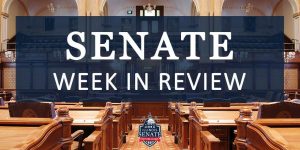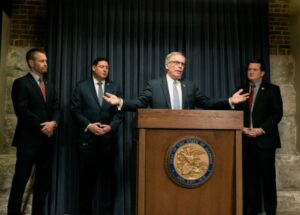
SPRINGFIELD – Lawmakers returned to the Capitol during the week to kick off the 2024 regular legislative session.
During the first of week of session, four Republican lawmakers offered legislative solutions to a migrant crisis that is overwhelming state and community resources, and Senate Republicans called on the Governor to reverse his proposed budget cuts to programs that help Illinoisans with developmental disabilities.
In other news, lawmakers took up proposed rules for the state’s “assault weapon” ban.
Illinois legislative session begins as concerns mount about costs of immigration crisis
The Illinois General Assembly started its 2024 regular session on Jan. 15. Lawmakers spent much of the week meeting with constituents and other lawmakers, and drafting legislation they plan to file.
The General Assembly is expected to take up several serious issues during the session, including the ongoing immigration crisis and its associated costs. So far, Gov. JB Pritzker has chosen to deal with the crisis through executive action, bypassing the General Assembly while spending hundreds of millions in taxpayer dollars.
State Senator Dave Syverson (R-Cherry Valley) says Gov. Pritzker needs to be more transparent about how much is being spent on immigration services, and how much money is being taken away from programs designed to help Illinois citizens.

At a Capitol press conference on Jan. 16, Senator Syverson joined State Senator Andrew Chesney (R-Freeport), Assistant House Republican Leader John M. Cabello (R-Machesney Park) and State Representative Joe Sosnowski (R-Rockford) to discuss actions that led to the crisis and steps they believe will address it. According to the lawmakers, weak border policies by the Biden Administration and Illinois laws that act as incentives to lure undocumented people to the state are largely to blame for the 34,000 migrants that have come to the state thus far.
All four legislators represent the region of Illinois that includes the Chicago-Rockford International Airport, and Senator Chesney spoke about the chaos that ensued after a plane filled with more than 350 migrants arrived with little notice at the Rockford airport in the early morning hours of New Year’s Eve. “The arrival of this plane threw airport and local officials into a state of panic and emergency mode,” said Senator Chesney. “No one knows if this was a one-time event or if more planes carrying migrants will be landing in Rockford.”
One piece of legislation that will be filed in the coming days is a repeal of portions of the TRUST Act that prohibit law enforcement from working with federal Immigration and Customs Enforcement officials to ensure enforcement of federal immigration laws.
A second policy proposal seeks to roll back laws passed in recent years that provide free healthcare for migrants and illegal immigrants in Illinois – a program that exceeded its yearly appropriation in the first month it was in place. And Democratic lawmakers have expanded the program so this year it is expected to cost taxpayers as much as $1.1 billion. With no co-pays or premiums charged, the highest quality healthcare the Governor offers in Illinois is for illegal immigrants and migrants.
“This program has ballooned out of control, and we can expect this number to continue to grow as more non-citizens learn about the program,” Senator Syverson said. “Yet programs to help Illinoisans with developmental disabilities – whether in services, housing, or jobs programs – have been shortchanged for years. We currently have Illinois veterans who struggle to find adequate services, and we have citizens living with disabilities who struggle to find services. But migrants and illegal immigrants pay nothing for high quality healthcare.”
Senator Syverson said hard-working Illinois families with insurance have deductibles and co-pays and are required to pay premiums, in many cases substantial premiums. Yet at the same time, they are seeing their tax dollars go to fund health programs for non-citizens that provide better coverage than they could ever afford. Even those low-income struggling families who get coverage through the marketplace healthcare.gov or Medicaid do not have the same benefits or limitations that the non-citizens’ plan does.
“Our focus as a state should be on taking care of our own citizens, especially the most vulnerable, before opening our doors to undocumented individuals from countries all over the world,” Senator Syverson said.
A third bill would provide a framework that migrants and illegal immigrants can use for free travel back to their home country or to another sanctuary city or state.
According to the lawmakers, the legislative package is being finalized and will be filed prior to the Feb. 9 deadline for the introduction of bills.
The regular legislative session resumes at the Capitol on Feb. 6.
Governor must reverse proposed budget cuts to programs for persons with disabilities

Recently, the Pritzker Administration announced plans to make significant cuts to funding for programs that help Illinoisans with developmental disabilities. The specific cuts would amount to 2.5 million fewer hours that Direct Support Professionals could provide services in group homes, where approximately 10,000 adults with intellectual/developmental disabilities reside. The reduction would total around $87.7 million dollars, affecting 90% of all group home residents.
In response, every member of the Illinois Senate Republican Caucus signed a letter calling on the Governor to rescind these cuts to one of the state’s most vulnerable populations. They also noted that these cuts come at the same time spending for immigrant services has skyrocketed into the billions.
Senator Syverson says that Gov. Pritzker needs to immediately rescind this proposal that would be devastating to people who are already some of the most underserved. He says the Governor has already shorted programs that help persons with intellectual and developmental disabilities by half a billion dollars over the last five years by not implementing recommendations from a report by the independent Guidehouse Company.
Lawmakers discuss assault weapons ban rules

On the same day lawmakers returned to Springfield, the bipartisan and bicameral Joint Committee on Administrative Rules (JCAR) met to discuss new permanent rules for the state’s “assault weapons” ban (AWB) proposed by the Illinois State Police (ISP).
Currently, Illinois is operating under emergency rules that ISP promulgated last year. These new permanent rules will replace those emergency rules and contain changes, additions, and clarifications that ISP has worked on since the emergency rules were first published.
Numerous concerns have been raised about the potential for confusion caused by both the emergency and permanent rules. Critics have said the rules are too vague and could leave gun owners struggling to understand exactly which firearms, parts, and attachments are illegal or need to be registered.
Republican members of JCAR filed a motion to prohibit the new permanent rules from being put into place, citing many of the same concerns, but the motion failed on a party-line vote.
However, the Republican JCAR members were successful in filing a motion to object to the rules on the same grounds. ISP must respond in writing to the Committee’s objection before it can file the regulations with the Secretary of State’s Office to be adopted.

